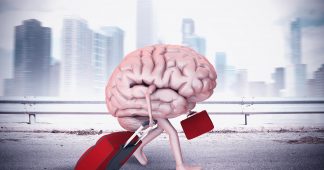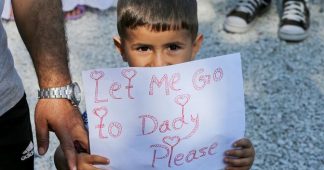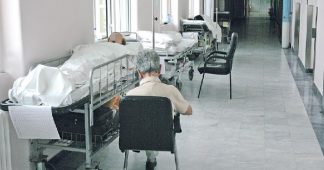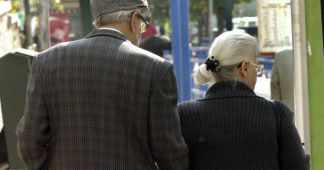March 16, 2020
The 8,000 kilometers that separate Michigan in the United States from Thessaly in central Greece is no easy distance to cover, yet 52-year-old financial consultant George Papadopoulos has become accustomed to the long journey. It’s been 30 years since he left his homeland to study in the US, where he stayed on to build a family and a successful career. His mother still lives in the city of Larissa, though, and she is never far from his mind. Is she OK? What if the phone rings and it’s an emergency?
“All of the Greeks who immigrated abroad and left their parents back home live with the guilt of not being able to take care of them as they’d like,” Papadopoulos, who makes the trip regularly, tells Kathimerini. “It’s become much worse since my mother was left alone following the death of my father 11 years ago and it only gets harder as time goes by because her health is becoming increasingly fragile.”
The phenomenon is a relatively new one for Greece. In a country where the main caregivers for the elderly have always been the family, hundreds of Greeks are growing old alone, far away from their children who have built new lives abroad.
Antonis Politis, a professor of psychiatry at Athens University’s Aiginiteio Hospital and head of the psychogeriatric department, has observed a surge in recent years of elderly patients who have no one to care for them coming to the hospital and special clinics with memory problems.
“Apart from people who are alone because they never married, for example, we are also seeing a large number of people who are alone because their children have left the country,” Politis tells Kathimerini.
These parents are victims of the brain drain that started 20-30 years ago with a wave of young Greeks going abroad to study and deciding to stay there to work. Many of the parents of that first wave are now in their 70s and 80s, and starting to show signs of mental and physical deterioration.
“How these children are going to look after their parents is becoming an issue. There’s a care vacuum,” says Politis, stressing that the problem will only get worse as the parents of young Greeks who left in the crisis-driven brain drain of the last decade also start to age.
“Along with the brain drain, there’s a care drain,” warns Politis. “Apart from a large section of specialized personnel, caregivers also left the country during the crisis. Over time, when their parents reach their 80s, we will have a care gap that I’m not sure we’re prepared for.”
In the meantime, the children have to deal with the guilt of being far away. “Distance has a multiplier effect, increasing their anxiety about their parents,” says the experienced psychiatrist.
When George Papadopoulos’ mother turned 80 and could no longer cope on her own, he moved her into a local home for the elderly, where she can receive the proper care and have company. “At least I know that someone will call me immediately if there’s an emergency,” he says.
The head of Greece’s Association of Elderly Care Units (PEMFI), Stelios Prosalikas, says that the association has also seen a spike in admissions of elderly patients who have no one to look after them.
“These are people who never married or have only one child or whose child/children live abroad,” he says, stressing that a care home is a luxury many Greeks cannot afford.
“Given the absence of state-run facilities, most people resort to hiring at-home caregivers, usually foreign women with no formal training who cannot entirely cope with the health problems some elderly people may present. Ask any building manager in Athens and they all have such a tale to tell. It’s a sign of the times,” he says.
Prosalikas believes that the phenomenon will get worse in the coming years. “Families used to consist of several children who could share the cost of taking care of their parents. Now there’s one child at best and things are getting tougher. The problem will really show itself when the parents of our more recent emigres reach the age of 85. Things tend to be OK until they reach their 80s.”
How to care for the country’s elderly people in the absence of family is a new challenge for society, institutions and experts. “We have to get organized,” says Politis. “We need some kind of record where lone individuals are registered so that each municipal authority knows how many there are and who they are. The authorities need to know who to notify that an older person has dementia and behavior disorders, who needs to be mobilized to protect them if they walk away from home unattended.”
Dementia and other such illnesses are a particular concern. “Dementia doesn’t just cause memory problems; it creates behavioral problems, depletes functionality and can come with a high number of comorbidities, meaning the appearance of a lot of parallel health problems. A caregiver at home cannot manage, nor can their child try to control the situation from far away,” Politis warns.
The experts say it is crucial to ensure that these people are not allowed to become isolated. “It is important to build bridges of communication with the local community and these need to be built early on so that prevention is possible. KAPIs [community day centers for the elderly] can play an important role, as can municipal authorities. The elderly should not be isolated at home. Isolation has a negative impact. Home care is another service that needs to be bolstered,” says Politis.
Papadopoulos was not happy with his decision to put his mother into care; he felt guilty. “These feelings subsided, though, after I met some of the home’s other residents, many of whom come from the same place my mother does. In any case, I plan to bring her to my place in Michigan for at least two months this year so that she’s close to us and can spend time with her grandchildren, of course.”
Shrinking birth rates and rising life expectancy are turning the age pyramid on its head all over Europe, and Greece is no exception, finding itself among the top three European Union member-states with the most rapidly aging populations. According to the most recent data from Eurostat, over-65s represent 21.8 percent of the population in Greece, a rise of 3.1 percent from 2008 (18.7 percent).
According to data from a study by Vyronas Kotzamanis, a professor of demographics and head of the University of Thessaly’s Demographic and Social Analyses Laboratory, the proportion of over-85s in the population in Greece currently stands at 3.5 percent, from 0.04 percent in 1951, while the 0-14 age group has been smaller than the over-65s since the late 1990s. In 2018, there were 800,000 more over-65s than those aged 14 and under.











